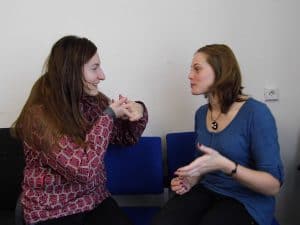Latest IPCC report warns we have 12 years to limit climate catastrophe
“Never doubt that a small group of thoughtful committed citizens can change the world; indeed, it’s the only thing that ever has.” Margaret Mead
Monday’s dire International Panel on Climate Change (IPCC) report weighed heavy on my mind as our family sat down for Thanksgiving dinner. While my three grandchildren giggled and squirmed on their chairs with innocent joy, it was hard not to feel deep sadness and anxiety for their future.

My grandson, Louie. What does the future hold for his generation if we continue to ignore the warnings of devastating climate change – photo by Drew Monkman
The international climate science community has just raised the threat advisory of catastrophic climate change from orange to a pulsating scarlet red. If the planet warms by much more than 1.5-degrees Celsius (we are already at one-degree of warming), the result will be soaring death rates, huge waves of climate refugees, devastating coastal flooding, the demise of all coral reefs, and unprecedented planet-wide species extinction. The predicted economic cost is counted in the tens of trillions of dollars.
The report does provide a glimmer of hope, however: Limiting warming to 1.5 degrees Celsius is still possible. To get there, greenhouse gas emissions would have to be cut by 45 per cent from 2010 levels by 2030, and then brought to zero by 2050.
Last week, I offered a hopeful vision of what Peterborough and the world could look like in 20 years, if decarbonization of the world economy was to become a reality. The vision incorporated everything from electric vehicles, dietary changes and more energy efficient homes to cancelling any new fossil fuel projects and accepting a carbon tax with revenues returned to the citizens. With this vision in mind, I want to focus on what we as individuals can do right now. But first, let’s get some real-world reasons for hope.
Inspiration
On a per capita basis, Canadians emit 15.6 tons of greenhouse gases, which is just slightly less than Americans. Looking at countries with a climate similar to ours, the Finns only emit 0.09 tons, Swedes 3.86 tons, and Norwegians 6.87 tons. Clearly, it’s possible for Canada to do much better. Scotland has already cut its emissions almost in half from 1990 levels. China and India are making huge leaps forward in deploying green energy, and the cost per kilowatt/hour for producing solar-generated electricity has fallen by 80 per cent since 2009. Wind power is also showing similar steep declines in cost. Affordable technology is available right now to vastly improve Canada’s performance.
Individual action
As much as recycling, driving a fuel-efficient vehicle and reducing meat consumption are important, they will not be enough. Changing social norms and taking political action are key.
1. Vote wisely: At this, the eleventh hour, a meaningful response must be led by all levels of government, including our local municipal councils. On October 22, I will be voting for a mayor and city councillors who understand the issue of climate change and are ready to act aggressively.
To understand how Peterborough can reduce its carbon emissions, I highly recommend reading the Greater Peterborough Area Community Sustainability Plan, which is posted at sustainablepeterborough.ca. The plan shows us how the interdependence of environment, economy, social life and culture must all be considered when government plans for the future. As voters, we must ask our candidates to explain how they would implement the policies in the document, and elect those whose understanding of what needs to be done is most convincing. For a list of candidates in your ward as well as contact information, visit PeterboroughVotes.ca.

Diane Therrien would make an excellent choice for Mayor of Peterborough in the October 22, 2018 election.
I also urge everyone to consult the “City Council Report Card” (at v4sp.ca) to see how local candidates compare when it comes to supporting sustainability. Based on past voting patterns (for incumbents) and the responses to a sustainability questionnaire each candidate received, the most progressive voices include Diane Therrien, Dean Pappas, Kemi Akapo, Jane Davidson, Jim Russell, Gary Baldwin, Keith Riel, Sheila Wood, Don Vassiliadis, Charmaine Magumbe, Kim Zippel, Stephen Wright and Zach Hatton.
2. Phone your elected representatives: Simply picking up the phone and talking to your elected representative or their office is hugely important. I recently heard that one reason the National Rifle Association is such a powerful force in the U.S. is because they make sure politicians’ phones ring off the hook when legislation is proposed that runs counter to their (misguided!) interests. Call the office of MPP Dave Smith (705-742-3777) and voice your support for either a meaningful price on carbon in Ontario or regulations that will accomplish the same amount of greenhouse gas reduction. Insist that the Ford government do its part to honour Canada’s Paris Accord promises. Let MP Maryam Monsef (705-745-2108) know you support the Liberal’s policy of imposing a carbon tax on provinces that do not have their own. Insist that revenues from the tax be directly refunded to households and not to the provincial governments in question. (N.B. The 2018 Nobel prize for economics was awarded to William Nordhaus for his groundbreaking work on carbon taxes. It’s clearly an idea that has huge merit.) If you live outside of Peterborough County, contact your elected representatives, as well.
3. Talk about climate change: We need to spread social norms that are positive to solutions. One of the most important actions we can all take is to simply talk about climate change with friends and family. Right now, many of us don’t even want to broach the topic. However, we’re often wrong in “what we think others think.” Most people are far more concerned about climate change than they ever acknowledge publicly. The more that people hear conversations on the topic, the more socially validated these conversations become. Showing your concerns and personal observations about the climate makes it easier for others to open up, as well.
You don’t have to be an expert. You really only need to say that 97% of climate scientists agree it’s happening now, it’s caused by humans and it’s going to get terribly worse if nothing is done. Mention the latest IPCC report. You could then add, “I believe the experts. If they were wrong on the fundamentals, we’d know it by now.” By simply stating, “I’m terribly worried about my kids’ and grandkid’s future,” you are communicating a message that others can relate to. Emphasize the solutions, nearly all of which are available now. Talk about the benefits to our health and to job creation. Most importantly, stress the importance of acting immediately.

It’s vitally important to be talking more about climate change with friends, families and even strangers. (photo by Mikhail Gorbunov via Wikimedia)
Start the conversation where others are at on the subject – not where they should be. How do you know? Ask them. Listen to their answers with patience and interest. It might be their family’s future, new diseases, severe weather events, or something else. Connect the issue to Peterborough and the Kawarthas. People are most open to acknowledging climate change when they are able to observe its effects locally. Point out the severe wind storms, the countless trees we’ve lost, the flood of 2004, the 23 days this summer over 30 C, the longer and more intense allergy season, and the invasive species choking our lakes and woodlands. Try to connect what you say to the values you share with this person – love of the outdoors or of family, for example. Remember, too, that the moment at which someone reverses a previously held opinion rarely happens during a single conversation. The goal is to increase the amount of conversation, not to make conversions on the spot or keep score. Be polite and challenge falsehoods or inaccuracies gently. In a world where there is already so much combativeness, your commitment to simple humanity, compassion, and respect will stand out.
A handful of people still deny the very reality of climate change. Many others don’t see the urgency of taking action or don’t support a carbon tax. You might ask these people the following: How have you come to this conclusion? How confident are you in this belief? Are you sure? Do you really think the scientists have got it wrong? If I showed you studies disproving what you’re saying, would that make a difference? What would make you change your mind? If not a carbon tax, how else could we quickly wean society off fossil fuels?
4. Be informed: For basic information on the greenhouse effect and climate change, I recommend climate.nasa.gov and realclimate.org. To learn how to address climate change denial arguments, visit skepticalscience.com. To stay up to date on the latest climate news, subscribe to the free Daily Climate newsletter at dailyclimate.org
5. Be active on social media: Share climate change information online and start discussions on social media platforms such as Facebook. You’ll be surprised by how many people will engage.
Is it too late?
Clearly, time is running out. Humanity essentially has ten years to cut greenhouse gas emissions by almost half. There’s no excuse this time; each and everyone of us who is concerned about our kids’ and grandkids’ future —and the natural world as we know it – must act.
My friend, Laura, recently shared an anecdote, which, I think, can give us hope. She wrote, “The survival skills of living creatures are incredible. For me, this really hit home when I rescued a dying snake plant. I had picked it out of a garbage can – sick, uprooted, dehydrated and leafless. I focused on supplying the basic needs: nutrients, water, sun and love – and then let it be. It wasn’t until two months later that the first root sprouted. I was thrilled! Since then, it has matured into a gorgeous, healthy plant. It surpassed the odds of a sure death. It not only survived but flourished.” As Laura says, every life form has evolved to maximize the same outcome: survival and, with time, flourishing. It’s in our human nature to do the same. Our children and grandchildren deserve nothing less.